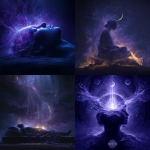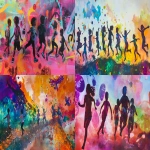Explore the Best AI Image Gallery

Marketings New Canvas: Exploring the Impact of AI Images
The marketing landscape is constantly evolving, with new technologies reshaping how brands connect with their audiences. One of the most exciting recent developments is the emergence of AI image generation, a field that is rapidly transforming the creative industry and opening up a world of possibilities for marketers.
A Creative Revolution: How AI Images are Changing Marketing
AI-powered image generation tools utilize sophisticated algorithms to create unique and compelling visuals from text prompts. This technology has the potential to revolutionize marketing in several ways:
- Cost-Effective Content Creation: AI images can significantly reduce the time and expense associated with hiring professional designers or photographers, making high-quality visuals accessible to businesses of all sizes.
- Personalized Marketing Experiences: AI algorithms can generate customized images based on user data, preferences, and behavior, allowing brands to create highly targeted and personalized marketing campaigns.
- Dynamic and Adaptable Content: AI-generated images can be easily modified and updated in real-time, enabling marketers to respond quickly to changing trends or market conditions.
- New Creative Possibilities: AI opens doors to innovative visual concepts that may be difficult or impossible to achieve through traditional methods, pushing the boundaries of creative expression in marketing.
Potential Applications Across Marketing Channels
The versatility of AI images extends across various marketing channels:
- Social Media: Generate eye-catching visuals for posts, stories, and ads to capture attention and increase engagement.
- Email Marketing: Personalize email campaigns with relevant and dynamic images that resonate with individual subscribers.
- Website Design: Create unique and engaging visuals for landing pages, product descriptions, and other website elements.
- Advertising Campaigns: Develop compelling visuals for print, digital, or video advertising to capture target audiences.
Navigating the Ethical Considerations
While AI image generation offers immense potential, it also raises important ethical considerations:
- Copyright and Ownership: Questions arise regarding the ownership and copyright of AI-generated images, as the creative process is largely automated.
- Bias and Representation: AI algorithms can perpetuate existing biases present in training data, potentially leading to unfair or inaccurate representations in generated images.
- Misinformation and Deepfakes: The ability to create realistic yet fabricated images raises concerns about the spread of misinformation and the potential for manipulation.
Looking Ahead: The Future of AI Images in Marketing
As AI technology continues to advance, we can expect even more sophisticated and versatile applications in marketing. Some key future trends include:
- Increased Personalization and Customization:** AI will enable the creation of hyper-personalized images tailored to individual customer preferences and needs.
- Integration with Other Technologies: AI image generation will likely be integrated with other technologies, such as virtual reality (VR) and augmented reality (AR), to create immersive and interactive marketing experiences.
- Ethical Frameworks and Regulations: As the use of AI in marketing expands, it is crucial to establish ethical guidelines and regulations to address concerns regarding bias, ownership, and misuse.
AI image generation presents both exciting opportunities and challenges for marketers. By embracing its potential while navigating ethical considerations responsibly, brands can leverage this transformative technology to create more engaging, personalized, and impactful marketing campaigns.
](https://images.ai-img.art/thumbnails/150/47d44e177f427ea6b32f96ea225db96c5158850a0cf01d1bad93e45dd4594430.webp)






](https://images.ai-img.art/thumbnails/150/c48401bc3fad7ff7f2dbd37b894d3f53cb42d5072dfacb8bfdcdeeef28a29b04.webp)








](https://images.ai-img.art/thumbnails/150/c2241c1eabdcb7b9a98be19a7e8d850b6cffe0e0c91c1ccda8dd807e2a96b187.webp)






](https://images.ai-img.art/thumbnails/150/44b76c49c47b4c47f13eac7883c63827d3f89aa77fe64ce0cbecb9d3ce434499.webp)



















](https://images.ai-img.art/thumbnails/150/09ccae5e68e2b6da6b5da87ef69f7eb09e80c99ca39ba886c5c3773cbb3b89ba.webp)





